Simple Flying
The history of thomas cook - 178 years of travel.
The story of a company that changed the world of travel forever.
Thomas Cook was closing in on two centuries of business before its demise in September 2019. After efforts to seek a £200 million bailout failed, Thomas Cook fell into liquidation, ending a business that had operated for 178 years. The failure of Thomas Cook Airlines became the biggest UK airline collapse in history, eclipsing Monarch Airlines, which had gone bust two years prior.
The bankruptcy left over 150,000 passengers stranded worldwide, and up to 600,000 customers had bookings with the airline when it went bust. Let's take a look at the fascinating history of Thomas Cook.

Railways expeditions
The agency's inception dates back to July 1841, with entrepreneur Thomas Cook offering his first excursion. Thomas Cook & Son offered trips to members of the Temperance Society via the Midland Counties Railway. Cook escorted 500 of these members from Leicester to a teetotal rally ten miles north in the nearby town of Loughborough.
Even though the trip may have been short, it would have been the first time many of these travelers entered a train. Therefore, the 500 paid one shilling and sixpence each, which is around £7.00 (adjusted for inflation) for the return trip.
The Derbyshire native soon offered excursions across the counties with a service from Leicester to the vibrant city of Liverpool in 1845. Soon after, Cook used his decade of experience to lead tours of Wales, Ireland and Scotland in 1851. These feats attracted investment from important national figures who wanted to use Cook's services.
Cook was therefore persuaded to use his setup to bring workers from the Midlands and Yorkshire for the Great Exhibition in the UK during 1851. By the time this London event was finished, Cook had taken 150,000 people across the country.
International adventures
This success gave Cook the confidence to expand internationally, combining various forms of transport. From the mid-1850s, Cook's business serviced routes across the English Channel from Essex to the Belgian city of Antwerp. This gave way to a circular tour that included the European cities of Brussels, Cologne, Heidelberg, Baden-Baden, Strasbourg and Paris - Cook's twist on the 'Grand Tour' opened up travel to social classes below the nobility.
Subsequently, the birth of two key aspects of modern tourism was seen following these tours. The first was the 1868 introduction of the hotel coupon, which helped customers pay for their hotel and meals. The second was the 1874 creation of the circular note, which was an early form of the traveler's cheque.
Thereafter, Cook further expanded on his international growth to venture across the Atlantic - a network of North American tours, covering 4,000 miles of railways was set up from 1865. Along with this, Cook set up systems in Egypt with steamers he hired to travel up the river Nile. These milestones were followed by annual world tours using Cook's experienced network and systems.
Ownership changes
Thomas Cook passed away in 1892, leaving John Mason Cook to take the reins of his father's operations. The businessman continued to grow the company from its two offices in Leicester and London before passing away seven years later. The firm was then taken on by Thomas' grandsons until their decision to retire in 1928. Ernest and Frank Cook sold the business to its first outside owners.
Discover more aviation news with Simple Flying.
At this time, Compagnie Internationale des Wagons-Lits became the proud owners of Thomas Cook. The French company were famed for their ambitious operations with the Orient Express and were looking to expand their presence.
The firm was sold to Hays Wharf Cartage Company during World War II - however, after the war, the company was nationalized in 1948 to become part of the British Transport Commission. The boom of commercial aviation in the post-war years benefited Thomas Cook, with the firm profiting £1 million in 1965.
After nearly three decades, Thomas Cook was again privatized after surviving the 1970s recession. The group used its expertise in package holidays to ensure safety during a time when many travel firms collapsed. Midland Bank became the sole owner of the business in 1977 and the firm vastly improved customer relations. Proposals such as the launch of the 1974 Money Back Guarantee scheme helped enhance customer service and increased reliability in the years to come.
Entering the modern era
Thomas Cook was then sold to German bank, Westdeutsche Landesbank and charter airline LTU Group for £200 million in 1992. It was during this period that Thomas Cook Group set up its own airline - initially named JMC - in 1999. This ownership lasted only nine years as Thomas Cook was again sold in 2001, this time to German company, C&N Touristic AG, and its airline branch was rebranded to Thomas Cook Airlines in 2003. In 2007, this business merged with MyTravel Group to form Thomas Cook Group plc.
Unfortunately, the travel group soon began racking up more debt - in 2011, its debts exceeded £1 billion and the airline survived by the skin of its teeth with an emergency cash injection. However, mounting interest payments and changes in the holiday industry made things increasingly tough for Thomas Cook. Travelers were also increasingly booking online - making Thomas Cook's 500+ high street outlets slowly redundant - and opting for city breaks over Cook's typical beach package getaways.
By 2019 - the year it would go bankrupt - Thomas Cook's debts had reached around £1.7 billion, and it had paid over £1 billion in interest to lenders over the preceding decade. It desperately sought funding to stay afloat but was unable to secure the £200 million it needed. Then, on September 23, 2019, the old powerhouse finally ceased trading after 178 years.
Check out our analysis on what went wrong at Thomas Cook .
The Thomas Cook legacy
Thomas Cook's mark can be seen all over the world today. The company pioneered package holidays with unique incentives from the beginning. The firm also continued to revolutionize the travel industry by utilizing the ever-changing modes of transport over the years. The package holiday model is still enjoying a boon in the UK, as seen in the success of Jet2.com, now the UK's third-largest airline.
After 178 years of providing travel services across the globe, Thomas Cook's legacy won't be forgotten. As for its fleet , Thomas Cook had 34 aircraft in its possession when it collapsed - 27 Airbus A321s and seven A330s. The majority of these planes were returned to their lessors and found new homes, now flying with a diverse range of carriers like Vietjet, Air Transat and S7 Airlines. A few would end up on the scrap heap, including three A330s abandoned at Manchester Airport which were deemed "unsellable".
Did you use to fly with Thomas Cook? Do you wish the airline would have stayed afloat? Let us know in the comment section.

Sign Up Today
Start your 14 day free trial today

The History Hit Miscellany of Facts, Figures and Fascinating Finds
Thomas Cook and the Invention of Mass Tourism in Victorian Britain

Harry Sherrin
03 mar 2022.
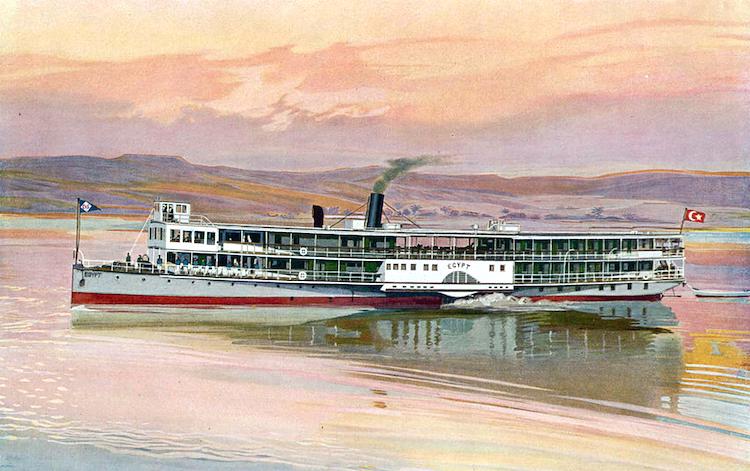
After its inception in the mid-19th century, the travel agency Thomas Cook pioneered the development of mass tourism, launching the world’s first travel guidebooks, package holidays and round-the-world tours.
Thomas Cook grew from humble beginnings, carrying temperance activists to meetings by train in the English Midlands, into a vast multinational company. In the 19th century, its tours catered to increasingly wealthy Victorians during the height of the British Empire , successfully championing a travel revolution.
But in 2019, Thomas Cook declared bankruptcy. It was the world’s oldest and longest-serving tour operator at the time, having existed for more than a century and a half and endured world wars, economic crises and the rise of the internet.
Here’s the story of Thomas Cook and the advent of global mass tourism.
Temperance trips
Thomas Cook (1808-1892), a devout Christian and advocate of the temperance movement, organised a one-day rail excursion for a temperance meeting in 1841. The trip, on 5 July, involved a train journey between Leicester and Loughborough, courtesy of an arrangement with the Midland Counties Railway Company.
Cook continued this practice over the following years, organising railway journeys for temperance activist groups around the Midlands of England. In 1845, he organised his first for-profit excursion, in the form of a trip to Liverpool for passengers from three locations – Derby, Nottingham and Leicester.
For this tour, Cook crafted a passengers’ handbook, now widely considered a precursor to the popular travel guidebook that would be produced to accompany travel excursions for decades to follow.
Branching out to Europe
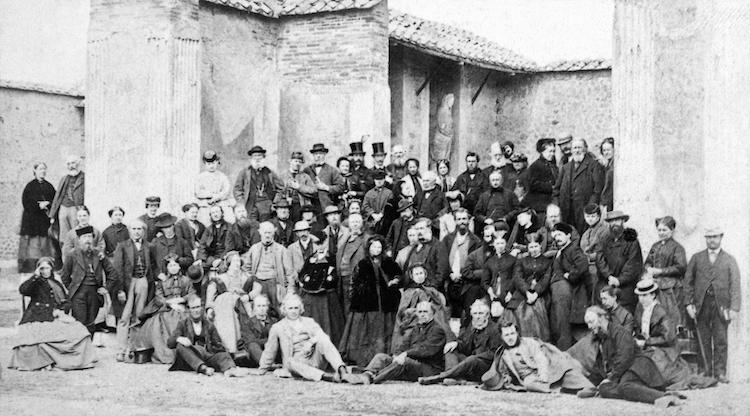
English tourist agent Thomas Cook and party in the ruins of Pompeii, Easter 1868. Cook is seated on the ground, just to right of center, in this carte-de-visite photograph.
Image Credit: Granger Historical Picture Archive / Alamy Stock Photo
By the 1850s, Cook had his sights set further afield than England. For the Paris Exposition of 1855 , for example, he organised guided trips from Leicester to Calais.
That same year, he also oversaw international ‘package’ tours, carrying parties from England to various cities in Europe, including Brussels, Strasbourg, Cologne and Paris . These excursions offered passengers everything needed to sustain them on their journeys, including transport, accommodation and meals.
By the 1860s, Cook’s sporadic temperance trips had grown into a profitable mass tourism operation – thought to be the first in global history. In response to his newfound success, Cook opened his first high-street store in London’s Fleet Street in 1865.
That same year, the London Underground opened as the first subterranean railway in the world. London was the most populous city on the planet at the time, and the enterprises of the British Empire saw wealth pouring into mainland Britain. With this came disposable income and, by extension, more Britons willing to spend large sums on international holidays.
For Cook, business was booming.
Going global
After tackling Europe, Thomas Cook went global. Now a father-son business comprising Thomas Cook and his son, John Mason Cook, the tour agency launched its first US tour in 1866. John Mason guided it personally.
A few years later, Thomas Cook escorted passengers on the company’s first trip to North Africa and the Middle East, stopping in Egypt and Palestine.
Tourism for Britons at the time was intimately tied to the endeavours of the British Empire. As British armies entered Egypt and Sudan in the late 19th century, so too did tourists, traders, teachers and missionaries, eager to capitalise on the newfound accessibility of far-flung nations and the relative safety offered by the presence of British forces there.
Thomas Cook and Son was even responsible for delivering military personnel and mail to British Egypt in the late 19th century.

1872 marked a huge moment in the history of Thomas Cook and indeed global tourism. That year, Thomas Cook escorted the first known round-the-world tour. The lengthy excursion, which lasted more than 200 days and covered nearly 30,000 miles, was targeted at wealthy Victorians – those with the time, funds and proclivity to see the world’s many cultures.
In that decade, Thomas Cook also helped invent the traveler’s cheque: the company offered a ‘Circular Note’ to its passengers which could be exchanged for currency around the world.
In the 1920s, Thomas Cook and Son launched the first-known tour through Africa. The excursion lasted some 5 months and took passengers from Cairo in Egypt down to the Cape of Good Hope.
Conquering air and sea
John Mason Cook took over primary leadership of the company in the 1870s, overseeing its continued expansion and the opening of various new offices around the world.
With this expansion came the launching of Thomas Cook’s company-owned steamers in the late 19th century. In 1886, a fleet of luxury steamers opened to passengers, offering cruises along the Nile.
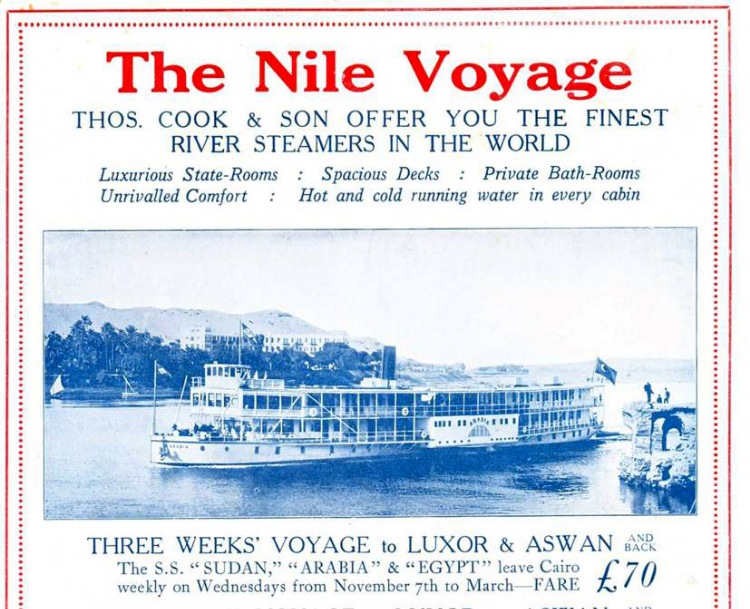
A Thomas Cook flyer from 1922 advertising cruises down the Nile. This kind of travel has been immortalised in works such as ‘Death on the Nile’ by Agatha Christie.
Image Credit: Wikimedia Commons
Thomas Cook eventually took to the skies in the 1920s, overseeing its first guided tour involving air travel in 1927. The trip carried 6 passengers from New York to Chicago, and also included accommodation and tickets for a Chicago boxing fight.
Into the modern era
During World War Two , Thomas Cook was briefly enlisted to assist with the ‘enemy mail service’, essentially the covert delivery of post from Allied regions to occupied territories.
The company went on to change hands several times during the 20th century, yet it managed to stay afloat despite various buyouts, economic crises and the rise of online travel agents.
In 2019, Thomas Cook was handed a bill of some £200 million by the Royal Bank of Scotland and other financial institutions. Unable to source the funds, the company declared bankruptcy.
At the time, Thomas Cook was responsible for more than 150,000 holiday-goers abroad. When the company collapsed, new arrangements had to be made to return every stranded customer home. The UK Civil Aviation Authority, which assisted with the repatriation efforts, called it the largest-ever peacetime repatriation in British history.

You May Also Like
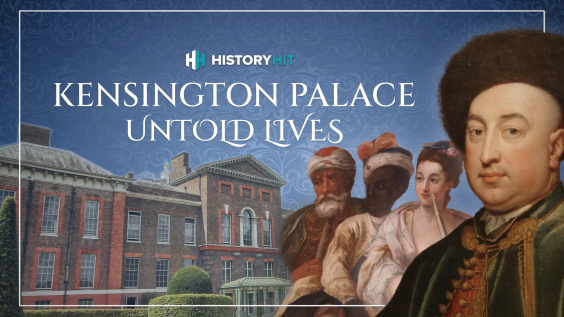
Mac and Cheese in 1736? The Stories of Kensington Palace’s Servants
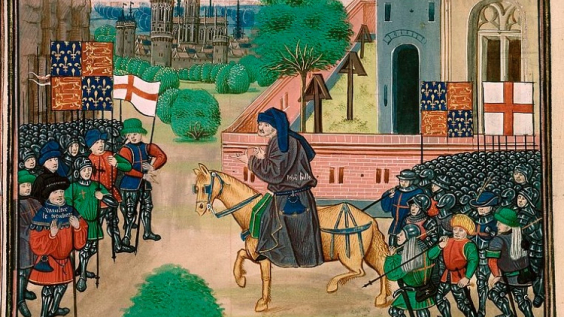
The Peasants’ Revolt: Rise of the Rebels
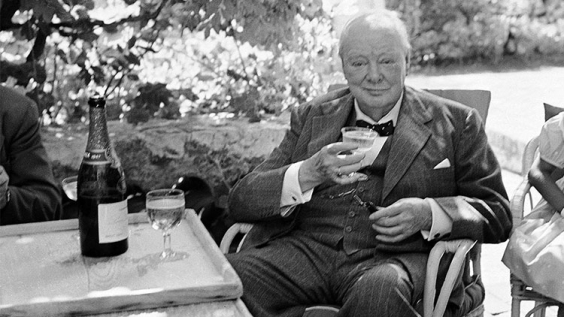
10 Myths About Winston Churchill
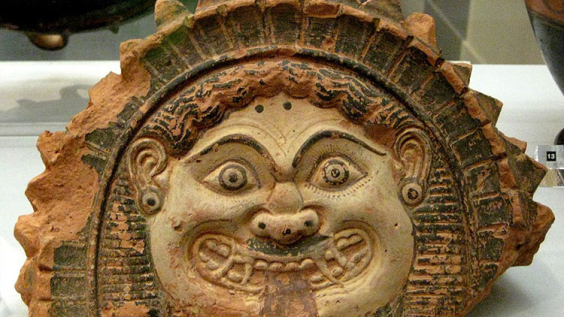
Medusa: What Was a Gorgon?
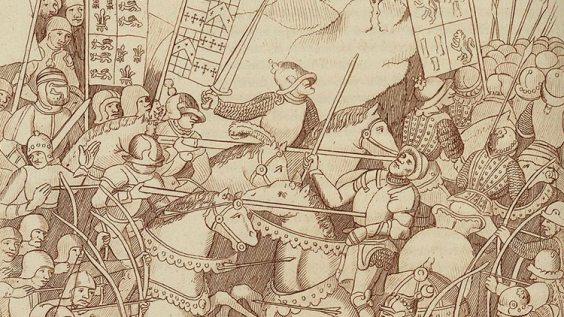
10 Facts About the Battle of Shrewsbury
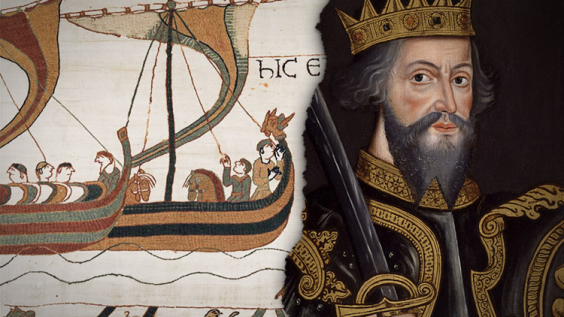
5 of Our Top Podcasts About the Norman Conquest of 1066
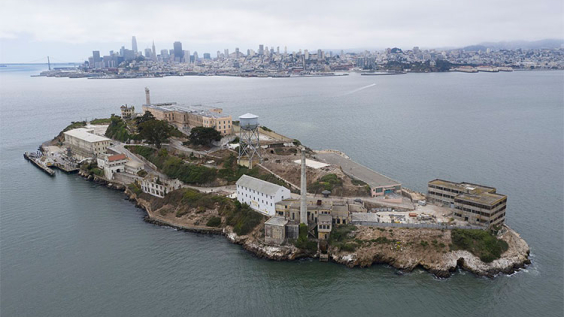
How Did 3 People Seemingly Escape From Alcatraz?
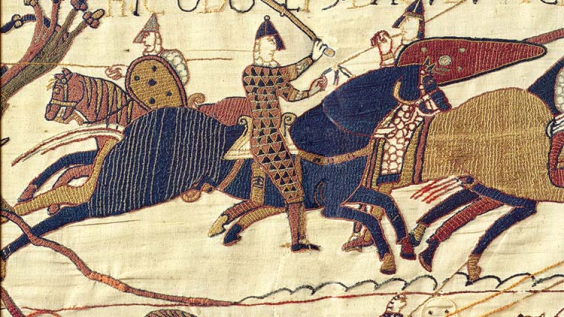
5 of Our Top Documentaries About the Norman Conquest of 1066
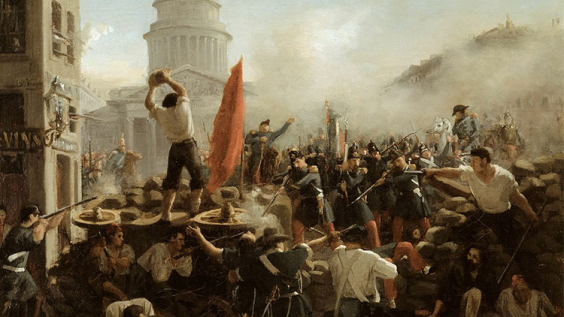
1848: The Year of Revolutions
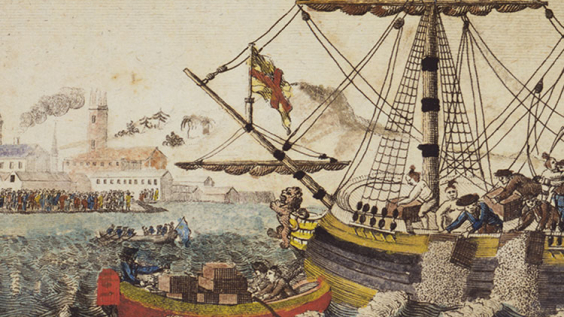
What Prompted the Boston Tea Party?

15 Quotes by Nelson Mandela

The History of Advent

The fascinating history of Thomas Cook
Disclaimer: Some posts on Tourism Teacher may contain affiliate links. If you appreciate this content, you can show your support by making a purchase through these links or by buying me a coffee . Thank you for your support!
The history of Thomas Cook plays an important role in the growth and development of the tourism industry. Thomas Cook is (or was) one of the biggest names in travel. Without this company the tourism industry wouldn’t look the way that it does today!
In this article, we take a look at the history of Thomas Cook in order to understand why this company is such an important part in the overall history of tourism .
The history of Thomas Cook: the very beginning
Thomas cook’s first excursions , the history of thomas cook & son, moving further afield , the history of thomas cook’s other successes , the modern history of thomas cook, the 1980s onwards, the collapse of thomas cook, the future of thomas cook, history of thomas cook: further reading.
Thomas Cook wasn’t just a company- there was a face behind the name! Thomas Cook himself was born in 1808 in Melbourne, Derbyshire, in the UK.
Business-minded from an early age, he started working for a local gardener at the age of 10. He earned six pence per week. At 14 he started an apprenticeship with his uncle, John Pegg, and worked for five years as a cabinet maker. He also became a Baptist missionary in 1826, touring the area as a village evangelist.
Later, in 1832, Thomas Cook moved to Market Harborough. On New Year’s Day 1833 he took the Temperance pledge. This meant he was part of a movement against the consumption of alcohol. Cook hosted meetings and held anti-liquor processions.
While walking to a Temperance Society meeting, Thomas Cook had an idea.
He decided, due to the extended Midland Counties Railway, that he would take a group of his fellow campaigners from Leicester Campbell Street Railway Station across to Loughborough to attend a teetotal rally. It was an 11 mile distance.
On July 5th 1841, Cook took around 500 people to this rally. They each paid one shilling for the privilege of a return journey with food and entertainment. He saw an instant demand for more of the same and the history of Thomas Cook begun…

Over the next few years Cook planned and executed various excursions.
In August 1845 he took a group from Leicester to Liverpool, having visited himself beforehand to arrange deals with hotels and restaurants as part of the overall trip experience for his clients.
In 1846 he arranged for 350 people to travel from Leicester to Scotland.
Then in 1851, Cook took 150,000 people to the Great Exhibition in London.
And four years later he arranged his first ever trip abroad. This was a grand circular tour of Belgium, Germany and France with the final stop being Paris for a special exhibition.
Keep reading and you’ll see that the history of Thomas Cook and the history of tourism go hand in hand…
In 1865, Cook got some business premises in London on the famous Fleet Street. This was always an important through route in the city, with businesses having been established here since the Middle Ages. It eventually became the home of British national newspapers, which it remained until the 1980s.
The history of Thomas Cook as a brand was born on Fleet Street. It was an office for Cook but also a shop: it sold guide books, footwear, telescopes, luggage and other travel essentials and accessories.
Cook introduced the hotel coupon in 1868, refining the business model. Essentially, Thomas Cook had a list of businesses (hotels as well as restaurants) and customers could buy a coupons which were to be exchanged for a meal or overnight stay at one of these establishments.
Seven years after opening the Fleet Street office, in 1872, Cook decided to partner up with his son, John Mason Andrew Cook, who was already working for him. Together they renamed the travel agency to Thomas Cook & Son. John provided a lot of commercial expertise, which allowed the company to grow.
Cook also opened a temperance hotel with his wife, Marianne Mason, located above the office.

A lot was happening at once. In 1866, the year after the Fleet Street office opened, the history of Thomas Cook moved slightly further afield.
The agency launched escorted tours of the US for British travellers, and they were the first to do so! John was the one to lead these excursions, which included tours of Civil War battlefields and more.
Later, in 1871, a partnership was born: Cook, Son and Jenkins. This was with an American businessman, but it didn’t last long and is largely forgotten about.
Also in the 1870s, Thomas Cook & Sons led the first ‘round the world’ tour. It left London in late 1872 by steamship – this headed across the Atlantic. Once in America the group boarded a stage coach. They then took a paddle steamer to Japan, then travelled overland across China and India. A lengthy trip, of course, but a fascinating one nonetheless!
Learn more: Thomas Cook: 150 Years of Popular Tourism
In the 1880s, when Thomas Cook himself had retired, John and his three sons grew the company even more. They were involved with military transport while organising tours to and of the Middle East; in 1884, the British army were transported up the Nile by Thomas Cook & Son – something quite big for the business!
By 1888, there were offices around the world. The history of Thomas Cook is one that started in Leicester and before long, was present in Australia , New Zealand and many other far-flung corners of the globe.
There are plenty of other things that Thomas Cook as a brand introduced to the travel industry .
For example, in 1874, Cook introduced something he called ‘circular notes’. These were essentially early travellers’ cheques, which offered people a secure was of using currency abroad without having to carry large amounts of cash around at any one time. The idea went on to be really popular.
Cook’s Continental Timetable launched in 1873 as a quarterly publication. It moved to being published monthly later, in 1883, and is now known as the European Rail Timetable . It was proposed by Thomas Cook employee John Bredall who thought it would be wise to publish a compendium of timetables for steamships and trains across the European continent . A softcover book, it shows all major lines and most minor lines too. Publishing was suspended in August 1939 due to World War II, and it picked up again during 1946.
It is still published today under its new name – but Thomas Cook stopped publishing it in 2013. A new company, European Rail Timetable Ltd, was born; owned by John Potter, a former member of editorial staff for the timetable, it still makes the book today. This is alongside the digital version which launched in 2016. The timetable comes highly recommended by tourists and business travellers as well as book shops, librarians, travel agents and high-profile travel writers.
What started as a family business didn’t stay that way. During the Edwardian times, travel became a much more popular activity and the business (now being run by John Mason Cook’s sons) was going extremely well. However, they sold the business to Compagnie Internationale des Wagons-Lits et de Grandes Express Europèens in 1928. This was the company who operated the Orient Express.
During World War II, however, the Paris HQ of Wagons-Lit was taken by the Germans after the Fall of France. The British assets were also taken over – by the Custodian of Enemy Property, who handled property claims created by war. Later, in 1942, Thomas Cook & Son was sold to Hays Wharf Cartage Company, which led to the company (Thomas Cook) being nationalised in 1948. It was part of the British Transport Commission.

In the 50s, the history of Thomas Cook and package holidays was solidified. The worked with scheduled (charter) airlines to sell all-inclusive tours to foreign destinations such as France, Italy , Switzerland and Spain. However these trips weren’t particularly cheap as the company didn’t want to compromise on quality. This led to a loss in share prices, and eventually the company was denationalised again in 1972.
It was now owned by a consortium made up of Trust House Forte, Midland Bank and the Automobile Association. Five years later in 1977, Midland Bank acquired sole control of the Thomas Cook and started to move administrative functions to Peterborough. By this time, the company was no longer known as Thomas Cook & Son, Ltd. It was now Thomas Cook Group Ltd.
It was during the 80s that Thomas Cook was really successful in the US. This was partly due to the aforementioned travellers’ cheques, and a whole US division of Thomas Cook was eventually sold for $1.3 billion in 1989.
During the 90s, Midland Bank was acquired by HSBC. They sold the Thomas Cook company to WestLB, a German bank, and the charter airline LTU Group. Amex bought the corporate side of things in 1994, and in 1999 the Carlson Leisure Group merged with the Thomas Cook Group Ltd.

By this time Thomas Cook had become a household name. They thousands of travel agencies and tour operators in the UK and partnerships around the world. The organisation demonstrated both vertical and horizontal integration , meaning that they had a significant market share and control over the market. There were many subsidiaries of Thomas Cook too.
Most recently in 2019, Thomas Cook collapsed.
The collapse of Thomas Cook led to various holidaymakers having to be repatriated and thousands of future holidays being cancelled. There were many potential causes of the collapse: Brexit uncertainty, of course, as well as high fuel costs, terrorist attacks and more. Hays Travel acquired all 555 of the UK Thomas Cook stores and were able to save around 2,500 jobs.

The collapse of Thomas Cook shocked the world. The history of Thomas Cook was long and the company had established itself as a key player in the tourism industry marketplace. There is not one reason why the company collapsed, but rather a plethora of reasons. Perhaps they were not innovative enough in their thinking.
They could have implemented more niche tourism products and focussed less on mass tourism , for example, as there is clear evidence that consumers have been moving in this direction for some time. But hindsight is a wonderful thing I guess, and we will never know what ‘could have been’.
So does Thomas Cook have a future? Well, maybe- but not in the same way that we have known and loved Thomas Cook.
While 2020 was been a disastrous year for much of the travel industry, it did see the ambitious relaunch of Thomas Cook Tourism by Fosun International, an online travel company with 50 employees.
Fosun was already a Thomas Cook shareholder. The company paid around £11 million for the company trademarks, social media accounts and websites in November 2019. There is certainly a lot of scope for online. products and services in the future, so we will see what the future has in store for the new ‘Thomas Cook’, it will be interesting to see how this new venture pans out…
If you want to learn more about the fascinating history of Thomas Cook, I recommend the following resources:
- Thomas Cook: The Holiday Maker
- Thomas Cook: 150 Years of Popular Tourism
Liked this article? Click to share!
Thomas Cook: A 178-year history
- Share on WhatsApp
- Share by email
By Amie Keeley
Thomas Cook had a long and colourful history. Over its 178 years the iconic travel brand overcame huge challenges including the Second World War and the recession of the 1970s, and counted Mark Twain, Oscar Wilde, Rudyard Kipling and Winston Churchill among its customers.
The UK’s oldest travel agency brand can also lay claim to a number of travel “firsts”, including producing what was to be the forerunner of the modern brochure in 1851 – a publication called The Excursionist, which included rail fares – and being the first travel agent to sell leisure trips by air in 1919.
Who was Thomas Cook?
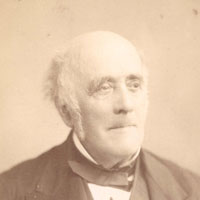
By 1855 he had started to organise trips overseas.
Thomas Cook was a social idealist. When he created the travel company, his goal was to improve society.
More: Thomas Cook ceases trading after failing to salvage rescue deal
Comment: The long death agony of Thomas Cook
Thomas Cook CEO: Every avenue and beyond explored to try to save business
Fosun Tourism Group ‘worked tirelessly’ in attempt to restructure Thomas Cook
Insolvency Service issues redundancy payment guidance to Thomas Cook staff
Thomas Cook: Industry mourns collapse of iconic travel brand
Thomas Cook: Cross-government taskforce to support staff
Thomas Cook archivist Paul Smith told Travel Weekly in 2016: “For Thomas Cook, travel was about social improvement. If people drank less, became better educated and did more with their time and money, society would benefit. Travel was a catalyst for improving society.
“If he could persuade trains to offer cheaper fares, he could promote them and enable more people from a lower class, the middle classes, to travel. In those days people did not travel for leisure; only those who were very wealthy. He was trying to make travel easier, cheaper and safer.”
When Cook opened his first shop, Thomas Cook & Son, at 98 Fleet Street, London, in 1865, he claimed to have booked one million passengers on his trips.
The shop sold railway tickets, tours, including to Paris, Italy and Switzerland, as well as luggage, guidebooks and telescopes.
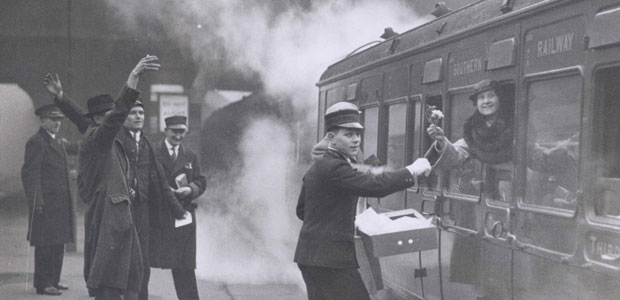
Thomas and his son John Mason Cook both died during the 1890s and the business was inherited by John’s three sons: Frank Henry, Ernest Edward and Thomas Albert.
In the first quarter of the twentieth century Thos Cook and Son dominated the travel market.
But in 1928, Frank and Ernest sold the business to the Belgian Compagnie Internationale des Wagons-Lits et des Grands Express Européens, which operated the Orient Express.
During the war its Paris headquarters were taken over by occupied forces and the business came close to collapsing. Its assets were requisitioned by the British government and it was later sold to Britain’s four main railway companies.
When these were nationalised Thomas Cook became state owned in 1948.
The business went on to flourish in the post-war boom and in 1965 reported profits in excess of £1 million.
In 1972 Thomas Cook became privately owned again and went on to survive the recession of that decade which had laid claim to a number of travel firms.
In the 1980s and 1990s Thomas Cook grew its long-haul touring programme, and expanded its retail network.
In 1992 Thomas Cook was sold by Midland Bank to German bank, Westdeutsche Landesbank, and charter airline LTU Group.
In 2001, German travel group C&N Touristic AG became the sole owner of Thomas Cook changing its name to Thomas Cook AG.
Six years later in 2007, Thomas Cook Group was formed by the merger of Thomas Cook AG and MyTravel Group plc.
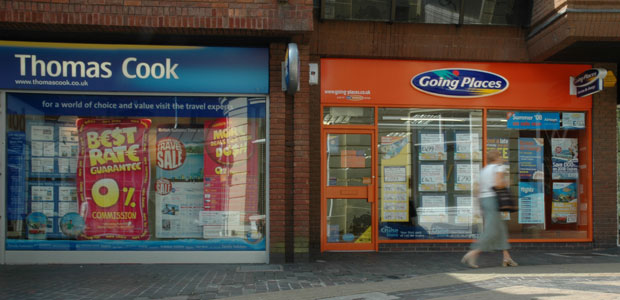
It went on to sign a joint venture with The Co-operative Group increasing its shop network to 1,200. Thomas Cook’s Going Places branded branches were rebranded under the Co-operative’s brand.
More recently, Thomas Cook has faced competition in the package holiday market from the likes of Jet2holidays, which became the second-largest Atol-holder in the UK in 2017 – a spot held by Cook for years.
It closed several hundred shops over the last three years with its store network reduced to around 550. It began expanding its own-brand hotel portfolio hoping it would build future success.
But last summer’s extended heatwave, Brexit and a £1.1 billion write-down of its MyTravel business in May this year have contributed to its eventual demise.
Share article
View comments, which warns about extras bumping up cost of budget flights, updated: birmingham airport reopens after security incident, clia hails 2023 ‘landmark year’ for cruise, travel industry could learn from fashion sector on sustainability, says abta expert, jacobs media is honoured to be the recipient of the 2020 queen's award for enterprise..
The highest official awards for UK businesses since being established by royal warrant in 1965. Read more .
Stay up to date with notifications from The Independent
Notifications can be managed in browser preferences.
UK Edition Change
- UK Politics
- News Videos
- Paris 2024 Olympics
- Rugby Union
- Sport Videos
- John Rentoul
- Mary Dejevsky
- Andrew Grice
- Sean O’Grady
- Photography
- Theatre & Dance
- Culture Videos
- Food & Drink
- Health & Families
- Royal Family
- Electric Vehicles
- Car Insurance deals
- Lifestyle Videos
- UK Hotel Reviews
- News & Advice
- Simon Calder
- Australia & New Zealand
- South America
- C. America & Caribbean
- Middle East
- Politics Explained
- News Analysis
- Today’s Edition
- Home & Garden
- Broadband deals
- Fashion & Beauty
- Travel & Outdoors
- Sports & Fitness
- Sustainable Living
- Climate Videos
- Solar Panels
- Behind The Headlines
- On The Ground
- Decomplicated
- You Ask The Questions
- Binge Watch
- Travel Smart
- Watch on your TV
- Crosswords & Puzzles
- Most Commented
- Newsletters
- Ask Me Anything
- Virtual Events
- Betting Sites
- Online Casinos
- Wine Offers
Thank you for registering
Please refresh the page or navigate to another page on the site to be automatically logged in Please refresh your browser to be logged in
Thomas Cook: A timeline of the world’s oldest tour operator
Simon calder explores 10 key years that tell the story of the legacy travel company, article bookmarked.
Find your bookmarks in your Independent Premium section, under my profile
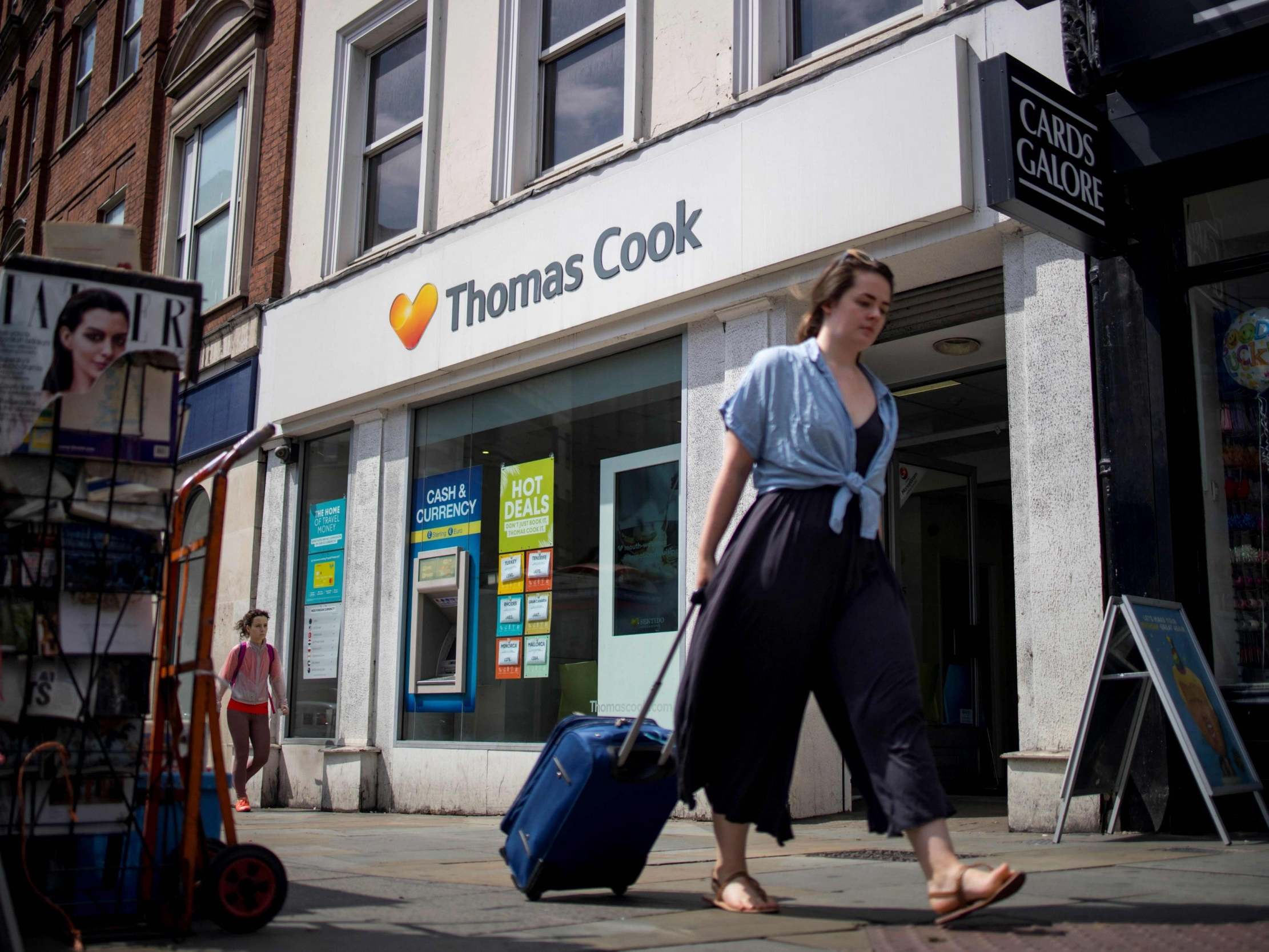
Sign up to Simon Calder’s free travel email for expert advice and money-saving discounts
Get simon calder’s travel email, thanks for signing up to the simon calder’s travel email.
As we say goodbye to the world’s oldest tour operator, here are the most important years in Thomas Cook ’s illustrious history.
1841: Rail revolution
Thomas Cook single-handedly industrialises railway tourism – chartering a train to take 500 passengers about 10 miles from Leicester to the neighbouring town of Loughborough on Monday 5 July.
The fare for the round-trip is one shilling and sixpence (7.5p). A spiritual and abstinent man, Cook organised the trip to attend a Temperance meeting. But for many of the participants, the attraction was the opportunity to travel by train for the first time.
1855: Cook goes international
The international exposition in Paris, set in the dramatic surroundings of Baron Haussmann’s newly redrawn city, provided the perfect target for Thomas Cook’s first international expedition. The steadily rising incomes and increased aspirations of the middle classes brought about by the industrial revolution convinced Cook that there would be a market for trips from London to Paris.
Thomas Cook collapse: Passengers stranded and thousands of jobs lost
He offered a complete holiday “package” (comprising travel and accommodation, as well as meals) for the first time.
1865: A travel agent is born
Thomas Cook opens a travel agency in Fleet Street, central London. It coincides with the opening of the London Underground, the world’s first subterranean railway.
1874: Cheque it out
“Cook’s Circular Note,” the prototype of the traveller’s cheque, is launched – providing a safe and easy way to carry funds abroad.
1892: Next generation
Thomas Cook dies in Leicester. The business is taken on by his son, John Mason Cook – whose initials are later used for a rebrand of the firm’s package holidays (an experiment which is swiftly and expensively reversed).
1928: Up for sale
The last two Cooks, Thomas’s grandsons Frank and Ernest, retire. They sell the business to the first of many outside owners, the railway sleeping car firm Compagnie Internationale des Wagons-Lits.
1948: Nationalisation
During the nationalisation of the UK’s railways, Thomas Cook somewhat bizarrely also becomes state-owned. Two years later, the first, embryonic mass-market package holidays by air are sold by a young man called Vladimir Raitz – comprising flights from Gatwick to Corsica, a tent on a beach and non-rationed meals.

1972: Staying the course
Thomas Cook reverts to the private sector, with the Midland Bank, hoteliers Trust House Forte and the Automobile Association buying the firm. Two years, the economic gloom of the “Three-day Week” precipitated by a miners’ strike, amplified by the Middle East oil crisis, finished off many travel companies. But not Thomas Cook.
1992: New owners
A German consortium, comprising Westdeutsche Landesbank and the LTU Group, acquire the Thomas Cook Group.
2019: It's all over
The Thomas Cook Group, by now an Anglo-German firm, ceases trading at 2am on Monday, 23 September
Join our commenting forum
Join thought-provoking conversations, follow other Independent readers and see their replies
Subscribe to Independent Premium to bookmark this article
Want to bookmark your favourite articles and stories to read or reference later? Start your Independent Premium subscription today.
New to The Independent?
Or if you would prefer:
Want an ad-free experience?
Hi {{indy.fullName}}
- My Independent Premium
- Account details
- Help centre
- Advertise with us
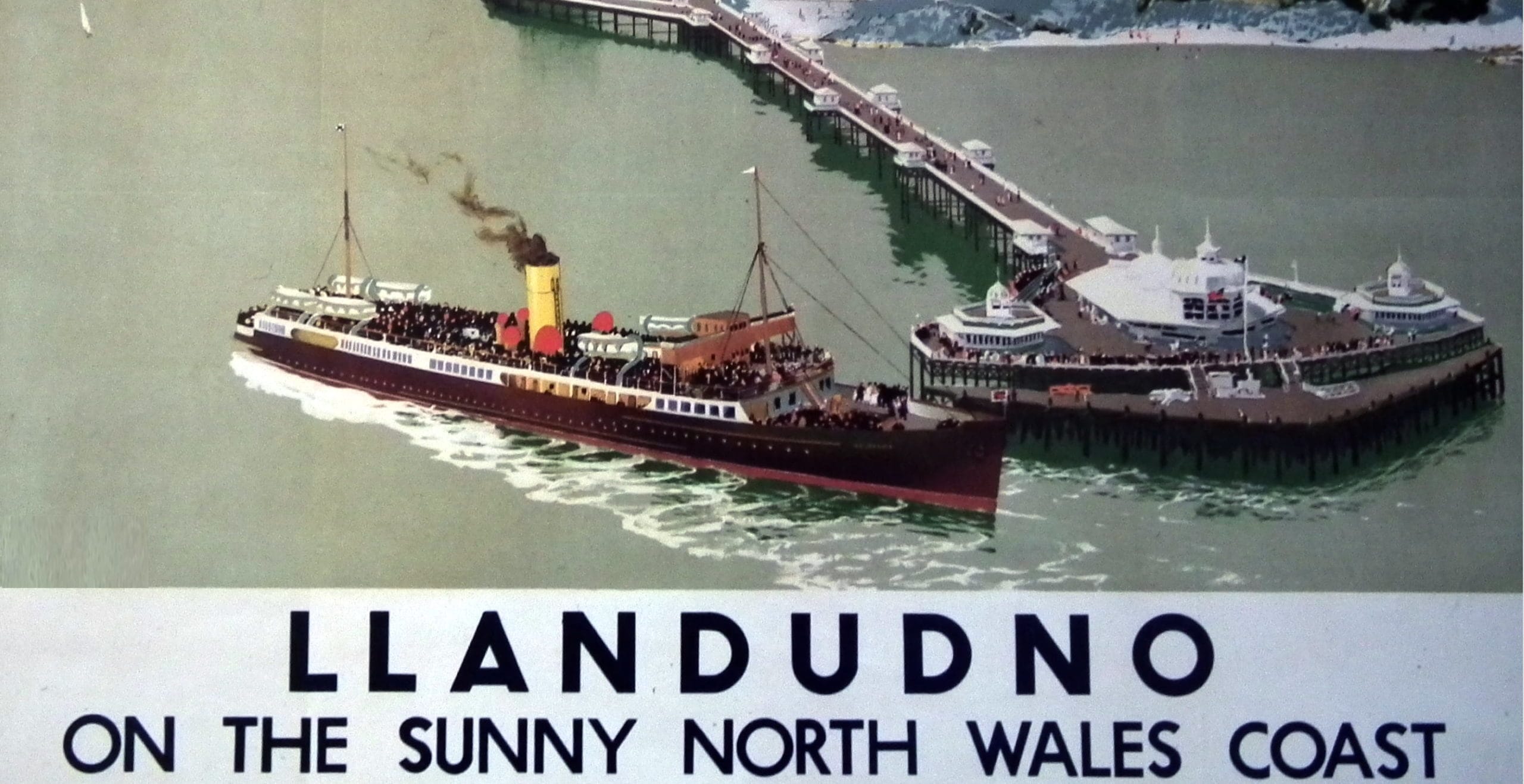
- History Magazine

Thomas Cook
2021 marks the 180th anniversary of Thomas Cook’s first step towards building the package holiday phenomenon. Through Thomas Cook’s belief in temperance and education he grew a travel company so all classes could enjoy the luxury of a holiday…
Shona Parker
2021 marked the 180th anniversary of Thomas Cook’s first step towards building the package holiday phenomenon. But ironically, wealth and social standing was the last thing on Thomas’ mind throughout his varied and illustrious career.
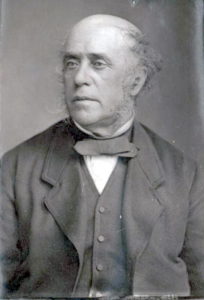
“We carried music with us, and music met us at Loughborough Station … and cheered us all along the line with the heartiest welcome … the whole affair being one which excited extraordinary interest, not only in the county of Leicester but throughout the whole country … All went off in the best style … and thus was struck the keynote of my excursions, and the social idea grew upon me.”
Thus wrote an exuberant Thomas Cook after his first organised day out for working class people of the Temperance Movement on 5th July 1841. A society devoted to encouraging others to give up alcohol and to try education instead, the Temperance members organised meetings, readings and family picnics as an alternative to hours spent in a pub. A member of the movement himself, Thomas decided to try something bigger to spread the word.
A fervent Baptist, Thomas believed in people helping themselves but recognised they could only do this if they were given the education and opportunity. At the same time, he surmised that travel educated a person by broadening their mind and firing the imagination, relaxing people and giving them hope. So he hoped to practise his ideas by arranging for 500 working class people to travel by train from Leicester to Loughborough to visit the Temperance quarterly meeting.
For most of his passengers, this was their first time on a train. Despite travelling Third Class in open air carriages, the whole trip was imbued with a holiday atmosphere, with villagers waving flags at the side of the tracks and Loughborough station decorated with banners, flags and props.
Mr Paget, a local dignitary, opened up his property Southfields for the day-trippers to use. White tablecloths were laid out under the shelter of trees and a typical English picnic of bread and ham and later crumpets and cake was consumed. Family games were arranged, and a cricket match enjoyed before minister after minister made rousing speeches accompanied by the band. It was the biggest teetotal party they had ever seen.
Thomas always wanted to help the poorer people in society as he had encountered his fair share of hardship. His father and stepfather both died when he was young and 10-year-old Thomas was apprenticed to a carpenter, working long hours and spending his free time in church. He grew up wanting a fairer society and a better democracy.
After Thomas married Marianne Mason in 1833, they opened up their home in Leicester to temperance travellers, as local inns were noisy, dirty, expensive and full of drunks. Leicester, like many towns in the north of England, had low life expectancy due to poor sanitation, a lack of freshwater reservoirs, hardly any drainage and an excess of factory pollution in the river Soar. It did a roaring trade in shoes and hosiery so there was the inevitable Victorian slum housing.
According to the Temperance Messenger magazine, Leicester was also home to 700 spirit shops, beer shops and pubs. It claimed the town had an above average amount of drunkards, prostitutes and cases of alcohol related diseases.
Fired up by the success of his first trip, Thomas set to organising more cheap Temperance days out for the working classes, volunteering his time and his own money to ensure success. Trips to Derby, Birmingham and Nottingham ensued, all underpinned by Thomas’ belief in feeding the soul with education and relaxation. In the summer of 1843, he took a crowd of Leicester teetotallers to the peaks of Derbyshire and parts of Yorkshire to breathe uncontaminated air.
Thomas tirelessly promoted his trips by printing and distributing leaflets and posters throughout the town. He gave promotional talks in the local Temperance Hall. In fact, although Thomas’s May Day trip wasn’t the first organised excursion by rail, it was the first to be promoted through the use of print material and proved a resounding success.
Thomas’ help for the working class didn’t stop at organising days out for them to try to forget their worries. He deeply abhorred alcohol and blamed it for the many problems the poor faced during the hungry Forties. He was a voracious anti-Corn Law protestor and orator, damning the use of cereal crops to make alcohol when hundreds of thousands of people were starving across the country.
He also promoted gardening, a new Victorian pastime, and bought potato seeds to distribute among the working class to encourage them to grow their own food. He even started printing a gardening magazine called The Cottage Gardener, covering the basics on how to grow vegetables and cultivate a cottage garden, although the copies no longer exist. He went onto help found the Leicester Allotment Society as another way of helping the poor to be fed but self-sufficient.
All this work came at the expense of Thomas’s own pocket and in August 1846 he filed for bankruptcy. Luckily, this no longer meant the shame and prison sentence it used to, and Thomas held onto his printing works and his home. This did teach him a valuable lesson though: he needed to make a hefty profit to continue helping the poor, and the best way to do this was to organise excursions for the middle classes.
Thomas had already decided to take the plunge in 1845, when he gathered up his courage and advertised his first commercial tour to Liverpool, with the opportunities to climb Mount Snowdon, explore Bangor and sail in a steamboat along the way, all backed up with his printed historical booklets. Despite tickets costing 10-15 shillings each, so clearly aimed at the middle class, demand for this trip far outstripped supply and another was planned a fortnight later. Thomas had found his niche. Cook’s Tours was born.
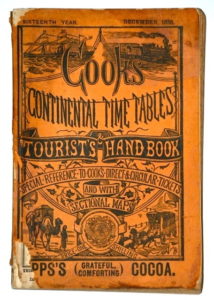
Although the company went on to become a package holiday phenomenon, Thomas never cared for gentrification. Large houses, country pursuits and members clubs passed him by as he continued to promote cheap travel for the masses.
In fact, he fell out with his son, as John Mason wanted to stop all non-profit making tours, but this went against everything Thomas stood for. He said of his son, “He does not like my mixing of missions with business; but he cannot deprive me of the pleasure I have had in the combination.”
Thomas’ last act of philanthropy was to build a pretty row of 14 memorial cottages and gardens in Melbourne, alongside a Baptist hall, a bakery and a laundry. Four flats were included for visiting Baptist ministers and their families, and a caretaker oversaw the upkeep.
When Thomas died on 18th July 1892, he had just £2731 in his bank.
William Gladstone summed up Thomas Cook in the Leicester Daily Post on the 20th July: “Thousands and thousands of the inhabitants of these islands who never would for a moment have passed beyond its shores have been able to go and return in safety and comfort, and with great enjoyment, great refreshment and great improvement to themselves.”
Written by Shona Parker. I blog about the social history behind the novels studied for GCSE English and drama at www.backinthedayof.co.uk. I include the type of social, political and economical paraphernalia which will pad out your knowledge and understanding, dispel your misgivings and make English history come alive!
Published: May 3rd, 2021.
History in your inbox
Sign up for monthly updates
Advertisement
Next article.
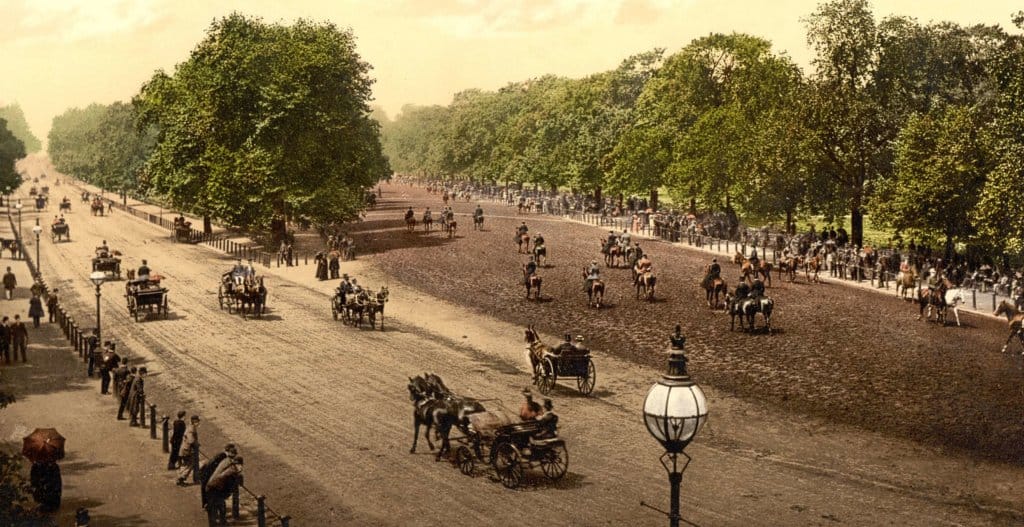
Augustus John Cuthbert Hare, Travel Writer
Travel writing was one of the most popular genres in 19th century Britain. The author Augustus Hare produced a guide 'Walks in London' which gives a fascinating view of the city at that time...
Popular searches
- Castle Hotels
- Coastal Cottages
- Cottages with Pools
- Kings and Queens
Key dates in the history of tour company Thomas Cook
- Medium Text
Compiled by Keith Weir; editing by James Drummond
Our Standards: The Thomson Reuters Trust Principles. New Tab , opens new tab

Business Chevron

Air New Zealand falls after earnings outlook cut on stiff competition
Air New Zealand trimmed its annual earnings estimates on Monday, citing economic headwinds and a cost-of-living crisis leading to softer revenue in domestic and North American markets, sending the carrier's shares to a near two-year low.

- International edition
- Australia edition
- Europe edition

Temperance tours to inclusive packages: a history of Thomas Cook
B y today’s standards of all-inclusive resorts with free bars and infinity pools, the first Thomas Cook holiday, which whisked customers 12 miles by train from Leicester to a temperance meeting in Loughborough, sounds like a hard sell.
But the excursion, organised in 1841 by Derbyshire cabinet-maker Thomas Cook for 500 like-minded supporters, laid the foundations of a business that made him the father of modern tourism . The former Baptist preacher believed the ills of Victorian society stemmed largely from alcohol, and saw a chance to spread the word via Britain’s flourishing rail network.
It would be another four years before Cook got into the tourist business proper, organising train trips from Leicester, Nottingham and Derby to Liverpool – this time for profit.
Then, in 1846, he ran the first of the Scottish tours that would soon become a lucrative operation. He conveyed 350 wide-eyed Sassenachs by train and steamboat to Glasgow, and for customers travelling for the first time, he offered guidebooks such as Cook’s Scottish Tourist Practical Directory – which had a chapter headed “Is It Safe for Ladies to Join in Highland Tours?”
Within a decade, Cook was running continental trips: he personally conducted a trip from Harwich to Antwerp, Brussels, Cologne, Heidelberg and Strasbourg that ended up in Paris for the International Exhibition in 1855.
The Leicester-based company became more ambitious, especially after Thomas’s son John Mason Cook joined. In 1865 they open their first travel agency on Fleet Street in London and the following year Cook junior led its first trip to America.
The world continued to shrink, and in 1873 Thomas Cook completed his first round-the-globe tour, marketed as “London to London”, for 200 guineas. About this time the firm became one of the first to use travellers’ cheques: it called them “circular notes”.
John took over in 1879 and ran the firm until his death 20 years later, when his three sons inherited Thomas Cook & Son. Its success continued into the 20th century as the skies opened up, with the company chalking up another first when it offered “pleasure trips by air” in 1919.
In 1928 the family sold up to the Belgian owners of the Orient Express, but the second world war saw it become part of the nationalised British Railways. After the war, sales took off again with the era of package holidays. By 1950, more than a million Britons were travelling abroad each year, mainly to France, Italy, Spain and Switzerland.
Thomas Cook returned to private ownership in 1972 and has seen a series of mergers and takeovers. In 2007, it merged with the UK-listed owner of Airtours, MyTravel Group , which nearly collapsed in 2011 but was bailed out by its banks . Now, 178 years on, in an industry its founder would not recognise, Thomas Cook may have come to the end of its journey.
- Thomas Cook
- The Observer
- Travel & leisure
Most viewed
Let's Look Again
A history of thomas cook & son (1841 – 2000).
Thomas Cook & Son pioneered popular tourism, and has ranked among the largest travel agencies in the world for much of its history.
Early life of Thomas Cook Thomas Cook (1808 – 1892) was born in modest circumstances in Melbourne, Derbyshire. He was raised as a New Connexion Baptist. Thomas Cook was just four years old when his father died.
Cook went to work as a gardener in Melbourne from the age of ten. His employer was a heavy drinker, and Cook noticed the detrimental effect this had on his business.
Cook was apprenticed to a wood turner in Market Harborough, Leicestershire from the age of 14. He would sometimes begin work at two or three o’clock in the morning so that he could finish work early and indulge in his passion of fishing in the River Trent.
Cook did not complete his apprenticeship, and instead went to work for a printer and publisher in Loughborough. His employer was a keen Baptist. Cook was engaged as a Baptist preacher from 1828.
Cook entered into business for himself from 1832, as a wood turner and cabinet market in Market Harborough. Cook became closely associated with the temperance movement from this time.
The travel agency business is born Cook organised an excursion from Leicester to Loughborough for 570 temperance supporters in 1841. It was the first time a British train had been chartered by a member of the public.
Cook relocated to Leicester later in 1841, where he worked as a printer and publisher.
Meanwhile, his travel agency business continued to grow. 300 people were taken to Scotland in 1846.

The growth of the railways had made travel more affordable, and Thomas Cook was quick to identify and exploit this potential market.
The Great Exhibition was held in London in 1851, and Cook arranged for 165,000 people to visit the capital. Profits were such that Cook was able to abandon the printing trade at this stage in order to devote himself to his travel agency business.
John Mason Cook John Mason Cook (1834 – 1899), son of Thomas Cook, was appointed head of a new office at Fleet Street, London from 1865. An energetic man, he made an immediate impact, and the subsequent growth of the business was due as much to the son as the father.
John Mason Cook entered into full partnership with his father from 1871, and the firm became known as Thomas Cook & Son, with an invested capital of over £250,000.

Business saw J M Cook travel an average of 50,000 miles a year between 1855 and 1873.
Thomas Cook retired in 1878, and John Mason Cook took full control of the firm.
Under the leadership of John Mason Cook, the business continued to expand until it had 84 offices and 2,962 staff (978 of them in Egypt) by 1891.
J M Cook died in 1899, and the gross value of his estate was assessed at £390,000. He was succeeded in business by his three sons; Frank Henry Cook (1862 – 1931), Ernest Edward Cook (1866 – 1955) and Thomas Albert Cook (1867 – 1914).
Conversion into a private limited company and successive owners Thomas Cook & Son became a private limited company with a capital of £800,000 from 1924.
The head office was relocated to larger premises at Berkeley Street, Piccadilly, from 1926.
Thomas Cook & Son was sold to the Compagnie Internationale des Wagons-Lits of Belgium, operators of the Orient Express, for £3.5 million in 1927. The merger created the largest travel agency in the world, and it was believed that considerable cost-savings would be made.
The sale of the business allowed Frank Henry Cook to retire as chairman in 1929. He died in 1932, with a gross estate valued at £1,054,769.
Thomas Cook & Son had operations in 300 locations, and employed over 4,000 people by 1939. The head office at Berkeley Street employed 1,500 people at peak periods.
Wagons-Lits came under German control during the Second World War, and Thomas Cook & Son assets were seized by the British government and handed to the four major railway companies.
The British railways, and Thomas Cook & Son with it, were nationalised in 1948.
Thomas Cook & Son claimed to be the largest travel company in the world in 1971. 10,000 people were employed across 420 offices.
The British government sold Thomas Cook & Son to a consortium of businesses headed by Midland Bank for £22.5 million in 1972.
Midland Bank sold Thomas Cook & Son to LTU, the third largest German travel agency, for £200 million in 1992. Westdeutsche Landesbank acquired Thomas Cook & Son the following year.
Preussag, the owner of TUI, the largest travel group in the world, acquired control of Thomas Cook & Son in 1999.
Carlson acquired Thomas Cook & Son in 2000.
One thought on “A history of Thomas Cook & Son (1841 – 2000)”
- Pingback: All’s fair in war: Faire Brothers of Leicester | Let's Look Again
Leave a Reply Cancel reply
Your email address will not be published. Required fields are marked *
Currently you have JavaScript disabled. In order to post comments, please make sure JavaScript and Cookies are enabled, and reload the page. Click here for instructions on how to enable JavaScript in your browser.
A history of branded Britain
This American Said He Had to Pay $2,400 to Get Home After Travel Company Thomas Cook Collapsed
T he collapse of one of the world’s oldest travel agencies has impacted an estimated 600,000 travelers all over the world on Monday—including some Americans.
Thomas Cook collapsed into liquidation in the early hours of Monday morning after rescue talks failed to secure $250 million in contingency funding, leaving many thousands who paid for vacations with the company without a return ticket home.
“We are sorry to inform you that all holidays and flights provided by these companies have been canceled and are no longer operating,” the Thomas Cook said, adding that all Thomas Cook retail shops have also closed.
Thomas Cook is a British company, but it attracted customers from all over the world, particularly Europe.
British stranded travelers are now directed to turn to the U.K.’s Civil Aviation Authority—which is working to fly back passengers who booked their flights with the travel agency and were due back to the U.K. between Sept. 23 and Oct. 6.
On Monday, Condor Airlines , a German airline subsidiary to Thomas Cook, said that it currently had 240,000 customers abroad awaiting flights to return home.
The travel agency also advised passengers who were due to fly out of the U.K. with Thomas Cook Airlines that their flights were canceled.
While few Americans are likely to be impacted, at least one Florida resident said he spent more than $2,000 to get home after booking a trip to Scotland with the company.
BBC Scotland spoke to American Joe Datolli, who was stuck at Glasgow Airport with his mother Sally waiting for a flight back to Orlando.
“It’s been frustrating… While we were asleep, ready to head back in the morning, they went out of business and there’s nobody to be seen,” he said.
Datolli told the BBC that he and his mother were able to book a flight to Orlando from Dublin but it ended up costing them nearly $2,400 dollars more.
Joe Datolli has had to pay $1600 to get a flight home from Glasgow to Florida today after the #ThomasCook collapse: pic.twitter.com/udPTqqHfxL — Clyde 1 News (@Clyde1News) September 23, 2019
“As we’re standing here trying to book another flight the prices keep climbing or the seats keep getting taken. It’s becoming more and more difficult,” he said.
The collapse of the agency has also affected thousands of employees.
In a statement, Thomas Cook Chief Executive Peter Fankhauser, apologized to customers and employees.
“I would like to apologize to our millions of customers, and thousands of employees, suppliers and partners who have supported us for many years. Despite huge uncertainty over recent weeks, our teams continued to put customers first, showing why Thomas Cook is one of the best-loved brands in travel,” he said. “This marks a deeply sad day for the company which pioneered package holidays and made travel possible for millions of people around the world.”
Here is what to know about Thomas Cook:
Why did Thomas Cook collapse?
Faced with Brexit, poor mergers and increased competition, the 178-year-old company finally fell to its demise on Monday.
Key to its downfall is Thomas Cook’s merger with MyTravel, a U.K.-based package travel company, in 2007. What had initially started out with hope, ended up in disaster. Thomas Cook ended up with huge debts that proved impossible to manage as, MyTravel had only made a profit once since 2001. The impact of the merger came to a head in May after Thomas Cook reported a record loss of £1.5 billion ($1.85 billion) and a steep drop in summer sales.
Thomas Cook also faced new competition from lower cost rival Jet2Holidays, putting the company’s profits under fresh pressure . Previously, the market had been split between Thomas Cook and Tui. Within two months, Thomas Cook had to issue two profit warnings .
Brexit didn’t help their situation either—the original March 29, 2019 Brexit deadline meant that people were nervous about booking holidays .
In August this year, there was hope that Thomas Cook could break free from disaster after it agreed to a $1.1 billion rescue deal with Fosun, a China-based investment company, Thomas Cook’s biggest shareholder and its debtholders.
However, as of Monday, Thomas Cook collapsed into liquidation after talks with shareholders, lenders and the U.K. government failed to come up with a rescue plan after the company’s banks demanded a further $250 million.
The agency was a popular one-stop-shop for travelers—known for its all-inclusive travel packages: the agency would book flights, hotels and tours for travelers.
Marc-David L. Seidel, professor at the University of British Columbia Sauder School of Business says travel agencies like Thomas Cook have become less relevant and necessary for travelers during the internet age.
“The rise of online travel information shifted power in the industry so that individual consumers no longer had to rely on brick and mortar travel agencies for expertise as much,” he tells TIME. “This intensified as the internet transitioned to more of an online travel community model where individual travelers share information about everything travel related to each other. That readily available and detailed information further reduced the power of travel agencies which had traditionally been the primary source of such expertise.”
Seidel adds that the rise of Airbnb might have also played a part.
“The growth trend of small travel providers such as individuals offering up rental units through internet platforms also puts pressure on organizations like Thomas Cook as a portion of their revenue was based on lodging,” he says.
Are American travelers affected?
While the bulk of Thomas Cook customers were based in Europe, the agency offered services to major U.S cities including New York City, Orlando and San Fransisco.
The State Department says that it is not able to track how many U.S. citizens are currently affected because American are not required to register their travel to a foreign country.
A State Department spokesperson tells TIME that the agency is currently monitoring the situation and that travelers should make their own arrangements to return to the United States.
“If Americans are destitute and without resources to get back to the United States, they should contact the U.S. Embassy or Consulate in the country where they are traveling to help them get in touch with family members or to evaluate other options,” a state department spokesperson said.
Frederic Dimanche, the director at the Ted Rogers School of Hospitality and Tourism Management at Ryerson University tells TIME that the effect on American passengers will be “not much” and that agency had a limited presence in the U.S.—with most of the company’s business coming from the U.K., Germany and Scandinavian countries.
“Thomas Cook had offices in the U.S., but beyond that most operations are European… this will likely be inconsequential for (travelers),” he says.
Seidel also says that the agency going out of business will most likely not have too much of an effect on American travelers.
“They have limited service in some cities—basically, it’s major cities and the leisure market, and a lot of that service would be outbound rather than inbound, so people visiting the States from Europe and a lot of their stuff was offered as packages,” he says.
More Must-Reads From TIME
- The 100 Most Influential People of 2024
- The Revolution of Yulia Navalnaya
- 6 Compliments That Land Every Time
- What's the Deal With the Bitcoin Halving?
- If You're Dating Right Now , You're Brave: Column
- The AI That Could Heal a Divided Internet
- Fallout Is a Brilliant Model for the Future of Video Game Adaptations
- Want Weekly Recs on What to Watch, Read, and More? Sign Up for Worth Your Time
Write to Gina Martinez at [email protected]
Thomas Cook bankruptcy: How the iconic travel brand went from transporting anti-liquor protesters in the 1800s to collapsing and stranding 600,000 passengers in 2019
- Thomas Cook , the once-illustrious British travel company and airline, declared bankruptcy early Monday morning.
- Before failing to secure $249 million in emergency funding and leaving 600,000 travelers stranded , Thomas Cook was one of the oldest and most respected travel firms in the world.
- Here is a look at the rise and fall of the historic company.
- Visit Business Insider's homepage for more stories .

Visit the Thomas Cook travel and airline website today and you'll be met with a simple message:
"The UK business has ceased trading with immediate effect and all future flights and holidays are cancelled."
After 178 years of being the biggest British name in holiday booking, Thomas Cook has declared bankruptcy. The bankruptcy has left 600,000 travelers stranded and 21,000 people out of work.
Read more : Stranded Thomas Cook customers say a single piece of paper taped to their hotel's reception is the only contact they've had from the collapsed tour operator
Keep reading for a look at the company's rich history dating back to 1841.
Thomas Cook was a Baptist missionary and cabinet-maker in Leicester, England in the 19th century. He was a part of the temperance movement and organized anti-liquor meetings in 1841.
Source: Story of Leicester
The first Thomas Cook holiday was a 15-mile railway ride for temperance movement supporters from Leicester to Loughborough.
Cook hired a train from the Midland Railway Company to transport temperance movement supporters in Leicester to an anti-liquor meeting in Loughborough in July of 1841. He charged the 485 passengers one shilling per person .
The excursions to temperance meetings expanded to other nearby temperance societies and Sunday schools. Cook recognized the commercial appeal by 1845, and organized a leisurely tour to Liverpool. It was booked by 1,200 people.
The service's popularity allowed Cook to expand to international travel within the decade.
Cook's son, John Mason Cook, took over the firm in 1879 and ran it for 20 years until his own death; his three sons then took it over for him.
Source: Telegraph, CNN
The possibility of air travel changed the company's scope and approach.
The company's slogan — "Don't just book it, Thomas Cook it!" — propelled the brand to household-name status for budget leisure travel , even after struggling through World War II and becoming state-owned and then privatized again in the late 1900s.
In 2001, Thomas Cook merged with one of Germany's largest travel groups and debuted Thomas Cook Airlines in 2003.
Thomas Cook was known for its low-cost, total-package vacation planning.
The company most recently boasted 22 million customers a year and just over 21,000 employees. The company also had 550 travel agency shops, 40,000 hotel rooms, and 105 airplanes.
The company mainly operated in 16 countries across Europe, North Africa, the Middle East, and Asia.
In a 2019 report issued by the company , Thomas Cook's most popular vacation destinations were listed as Spain, Turkey, and Greece.
Different experiences mentioned as package highlights included visiting banana plantations in the Canary Islands and enjoying local food in Tunisia.
A 2018 report stated that their most popular package was typically seven to 10 nights and highly customizable.
Source: Associated Press
The company almost went under in 2011 when its debt reached $1.24 billion.
It ultimately secured a little over $100 million in necessary funding and was bailed out, The Guardian reported in 2011.
However, in September 2019, attempts to secure $249 million failed, and Thomas Cook declared bankruptcy Monday, September 23, 2019.
Source: Business Insider
The brand was revered by Brits as iconic. Even Richard Branson, the founder of competing Virgin airlines, took to Twitter to acknowledge its demise.
"Saddened to see the demise of Thomas Cook – a firm that had been providing holidays for 178 years," Branson wrote on Twitter on September 23.
Source: Virgin
Thomas Cook's bankruptcy has left 600,000 people stranded at airports and hotels around the world, sparking what Reuters called the greatest peacetime repatriation effort in the UK. It has also left over 21,000 people jobless.
If the 178-year-old brand were to live on in some fashion, the only foreseeable potential buyer is Fosun, a Chinese conglomerate that was the company's largest shareholder, according to the BBC .
Source: Business Insider, NPR , Reuters
- Main content

- Diversity Inclusion
- Advisory Panel
- Our Audience
- Private Tourism Academies
- Tourism Ambassador Training
- Destination Training
- Tourism Keynote Speakers
- Sponsorship
- Business Class Podcast
- Skill & Knowledge
- Product Training
- Our Technology
- Become An Instructor
- Sponsorship Opportunities
- Product Training & Promotion
- Hire Us To Speak

The Evolution of Travel Agencies: A Historical Perspective
The history of travel agencies is a compelling narrative that has witnessed significant transformations over the years. This article explores the evolution of travel agencies from their early beginnings to the present day, highlighting key milestones and shifts in the industry.
Early Travel Arrangements:
Before the establishment of travel agencies, individuals took charge of their travel arrangements directly with transportation providers and accommodations. This process was often cumbersome and time-consuming, requiring considerable effort from the traveler.
Emergence of Travel Agencies:
In the 19th century, the concept of travel agencies began to take shape. Thomas Cook & Son, founded in 1841 by Thomas Cook, is recognized as one of the earliest travel agencies. Initially focusing on organizing railway outings, the agency later expanded its services to include international travel.
Growth and Globalization:
As transportation infrastructure grew and global travel became more accessible, the role of travel agencies expanded. They became intermediaries between travelers and various service providers, offering packaged tours and simplifying the booking process.
Technology and Online Booking:
The late 20th century witnessed a transformative shift with the advent of technology. The rise of the internet allowed travelers to research and book their trips online, reducing dependence on traditional brick-and-mortar travel agencies.
Specialization and Niche Markets:
As the travel industry diversified, agencies began specializing in specific niches such as adventure travel, luxury vacations, or eco-tourism. This specialization enabled agencies to cater to the unique preferences of different traveler segments.
Challenges and Adaptation:
The advent of online booking platforms and direct-to-consumer options presented challenges to the traditional travel agency model. However, many agencies have adapted by leveraging technology to enhance customer service, offering personalized experiences and providing expertise in complex travel arrangements.
Conclusion:
While the travel agency landscape has undergone significant changes, agents continue to play a crucial role, particularly for complex or customized trips. Their expertise and personalized service add substantial value, contributing to a resurgence in specific segments of the industry. The role of travel agencies continues to evolve in response to changing consumer preferences and technological advancements, ensuring their relevance in the dynamic world of travel.

Disclaimer: Opinions expressed in this article The opinions and viewpoints expressed in this article are intended to provide an insightful exploration of the history and evolution of tourism ambassadors. However, it is essential to note that these opinions do not necessarily reflect those of the author or the Tourism Academy. The article aims to present a comprehensive overview of the topic based on available information and research, but individual perspectives may vary. Please consider multiple sources and viewpoints when you understand the subject matter.
Leave a comment
Related articles, us travel's geoff freeman on leadership and industry transformation, family travel association: transforming travel agent accreditation with the tourism academy, unveiling the spirit of travel with bud geissler, 2024 american bus association marketplace chair.
- Share full article
Advertisement
Supported by
What Killed Thomas Cook, One of the Oldest Names in Travel?

By David Segal
- Published Sept. 24, 2019 Updated Sept. 26, 2019
The demise of Thomas Cook, Britain’s most venerated travel agency, is shaping up as one of the country’s greatest corporate fiascos.
When the agency went out of business on Monday , it left some 150,000 vacationers from the United Kingdom stranded on foreign soil. It put about 21,000 jobs at risk. It prompted calls for an investigation of its management and clawback of executive pay.
So what would Thomas Cook, the man, think of what has became of Thomas Cook, the company?
“He would be shocked and appalled,” said Piers Brendon, author of “Thomas Cook: 150 Years of Popular Tourism.” “Greed and incompetence have wrecked a fine company which has a name that resonated for nearly 200 years.”
Not surprisingly, the company has different theories for its collapse. In May, it reported a gargantuan loss of 1.5 billion pounds, about $1.9 billion, for the first half of the year. The heat wave of 2018 had “reduced customer demand for winter sun.” More important, its chief executive, Peter Fankhauser, cited uncertainties surrounding Brexit.
“There is now little doubt that the Brexit process,” Mr. Fankhauser wrote in the report, “has led many U.K. customers to delay their holiday plans for this summer.”
Some observers are, in fact, calling Thomas Cook the first major Brexit casualty. The contemporaneous decline in the pound, widely considered a Brexit side effect, has also made holidays more financially daunting.
But others maintain that the company’s fate was sealed long before the referendum was even put up for a vote. For years, Thomas Cook played a somewhat frantic and fantastically expensive game of catch-up as it tried to pivot into the digital age. In the end, Thomas Cook was groaning under $2.1 billion of debt, according to the company, most of it accumulated in pricey, ill-timed investments made years ago.
The most problematic was a 2007 merger with MyTravel, a major British competitor. The idea was to create a juggernaut, but combining the two companies proved a hugely expensive misstep. By 2010, debt at the newly christened Thomas Cook Group had more than doubled, to the equivalent of $1 billion. As recently as this year, the deal’s aftershocks were still being felt. Most of that £1.5 billion loss announced in May was attributed by the company to the MyTravel merger.
In 2010, Thomas Cook pulled off another deal, this time with the Co-operative Travel, which operated 400 stores located in areas of prime shopping real estate, or what is known in Britain as high streets. Added to Thomas Cook’s 800 shops, the company became the king of brick-and-mortar travel retail just as much of the clientele was headed online.
“The company had a large number of high street locations, and that’s historically where people would book holidays,” said Julie Palmer, a regional managing partner at Begbies Traynor, a corporate restructuring firm. “They’d go in, have a chat, look over some brochures for a couple hours to get some advice. Then they’d come back the next day and book their trip through a travel agent. I can’t remember the last time I booked a holiday like that.”
A cash crunch was underway by 2011, when Thomas Cook asked lenders for an injection worth about $125 million. And in 2012, the folly of the company’s high street strategy was laid bare when the company announced a turnaround plan that included the closing of 200 shops .
All of this would not merely exceed the imagination of Mr. Cook, a one-time cabinet maker and lay Baptist preacher, born in 1808. It would have been contrary to his nature, said his biographer, Mr. Brendon. The origins of his company could hardly have been more humble. It started with a kind of anti-booze cruise.
Mr. Cook considered alcohol a singularly malign force in the Victorian era, and at the age of 32, he organized a group of 500 like-minded citizens to go by train to a temperance meeting 12 miles away.
For the next three summers, Mr. Cook’s efforts were break-even civic acts inspired by a zeal for social reform, not profits. He considered travel the best alternative to the demon drink. By 1845, he started making money, first with a trip to Liverpool, then Wales, Scotland and Ireland, and later beyond the United Kingdom — to the United States, Europe and the Middle East.
With railroads transforming travel, his timing was impeccable. The company was soon targeting the wealthiest demographics.
“The company quickly moved upmarket, into the aristocracy, and became known as the travel agents to the British Empire,” Mr. Brendon said. “It was almost like part of the civil service. It was the company that transported all of the most important people to Queen Victoria’s Diamond Jubilee.”
In 1928, the Cook family sold out to a Belgian company, Compagnie Internationale des Wagons-Lits. When Germany occupied Belgium in World War II, the British government nationalized Thomas Cook. Government management was criticized as slow-footed, but the 1950s and ‘60s were boom years for overseas travel.
“There was a huge desire to get away from the gray, from the austerity and rationing of postwar Britain,” said Roger Bray, a writer for Silver Travel Advisor, billed as a website for mature travelers. “People had more money, and they wanted to spend it.”
Thomas Cook went private again in 1972. The business changed radically with the advent of the internet, making a la carte vacations easier to book at home. But packaged holidays — those all-in deals on flights and hotels, which have been the core of Thomas Cook’s business in recent decades — are still popular. The number of United Kingdom travelers who took this kind of holiday stood at 18 million in 2018, up four million from eight years earlier, according to ABTA, an association of travel agents and tour operators.
“If you go back 25, 30 years ago, it’s true that about 90 percent of holidays were packaged tours,” said Sean Tipton, a spokesman for the association. “It’s less than half now, but record numbers of people are taking vacations. So it’s still a strong business.”
The British government is spending £100 million, roughly $125 million, to fly stranded Thomas Cook customers home in what is being called the largest peacetime repatriation in the country’s history. The price tag could go up, but Grant Shapps, the secretary of state for transport, said it was far cheaper than a full bailout of the company.
For those who sank money into Thomas Cook, all that’s left is investor’s remorse.
Neset Kockar, a Turkish businessman, recently took an 8 percent stake in the company, seeking a role in its rescue. After its collapse, he told the website turizmguncel.com , “I didn’t know it was this badly run. You can’t make so many mistakes, one after another.”
An earlier version of this article mischaracterized the Thomas Cook customers who were stranded when the company went out of business. About 150,000 vacationers from the United Kingdom were stranded on foreign soil, not 150,000 total.
How we handle corrections

IMAGES
COMMENTS
1871: The official name of the company becomes Thomas Cook & Son. 1872/73: Thomas Cook organizes and leads the world's first round-the-world tour. The journey takes 222 days and covers more than ...
The story of a company that changed the world of travel forever. Thomas Cook was closing in on two centuries of business before its demise in September 2019. After efforts to seek a £200 million bailout failed, Thomas Cook fell into liquidation, ending a business that had operated for 178 years. The failure of Thomas Cook Airlines became the ...
Thomas Cook is the creator of the travel industry as we know it! Born on 22nd November 1808 in Melbourne (no, not that one; the one in Derbyshire, England), he made use of the new-fangled Victorian railways and steamships to arrange the first package trips. Thomas Cook died on 18th July 1892.
Thomas Cook & Son. Thomas Cook (22 November 1808 - 18 July 1892) was an English businessman. He was best known for founding the travel agency Thomas Cook & Son. He was also one of the initial developers of the "package tour" including travel, accommodations, and the like.
Thomas Cook (born November 22, 1808, Melbourne, Derbyshire, England—died July 18, 1892, Leicester, Leicestershire) was an English innovator of the conducted tour and founder of Thomas Cook and Son, a worldwide travel agency. Cook can be said to have invented modern tourism. Cook left school at the age of 10 and worked at various jobs until ...
After its inception in the mid-19th century, the travel agency Thomas Cook pioneered the development of mass tourism, launching the world's first travel guidebooks, package holidays and round-the-world tours. Thomas Cook grew from humble beginnings, carrying temperance activists to meetings by train in the English Midlands, into a vast ...
The history of Thomas Cook plays an important role in the growth and development of the tourism industry. Thomas Cook is (or was) one of the biggest names in travel. ... The timetable comes highly recommended by tourists and business travellers as well as book shops, librarians, travel agents and high-profile travel writers.
Thomas Cook <TCG.L>, the world's oldest travel firm, collapsed on Monday, stranding hundreds of thousands of holidaymakers around the globe and sparking the largest peacetime repatriation ...
By Amie Keeley. Thomas Cook had a long and colourful history. Over its 178 years the iconic travel brand overcame huge challenges including the Second World War and the recession of the 1970s, and counted Mark Twain, Oscar Wilde, Rudyard Kipling and Winston Churchill among its customers. The UK's oldest travel agency brand can also lay claim ...
Thomas Cook opens a travel agency in Fleet Street, central London. It coincides with the opening of the London Underground, the world's first subterranean railway. 1874: Cheque it out
Shona Parker. 10 min read. 2021 marked the 180th anniversary of Thomas Cook's first step towards building the package holiday phenomenon. But ironically, wealth and social standing was the last thing on Thomas' mind throughout his varied and illustrious career. Thomas Cook circa 1880. "We carried music with us, and music met us at ...
The bosses of Thomas Cook <TCG.L>, the world's oldest travel company, were meeting lenders and creditors in London on Sunday to seek a last-ditch deal to save the company.
Thomas Cook's history - in pictures. ... Now the company which Cook founded is the largest travel agency in the world. It became a private limited liability company in 1924, and in 1948 its shares ...
Thomas Cook in 1850, with advertising posters dating from around 1910. ... a history of Thomas Cook. ... In 1865 they open their first travel agency on Fleet Street in London and the following ...
Thomas Cook & Son pioneered popular tourism, and has ranked among the largest travel agencies in the world for much of its history. Thomas Cook (1808 - 1892) was born in modest circumstances in Melbourne, Derbyshire. He was raised as a New Connexion Baptist. Thomas Cook was just four years old when his father died.
A Thomas Cook store in the United Kingdom, which is now operated by Hays Travel. Thomas Cook Group plc was a global travel group, headquartered in the United Kingdom and listed on the London Stock Exchange from its formation on 19 June 2007 by the merger of Thomas Cook AG — successor to Thomas Cook & Son — and MyTravel Group until 23 September 2019, when it went into compulsory liquidation.
Thomas Cook, one of Britain's oldest travel companies, ceased trading last night. Here, Chris Leadbeater recalls a trip down memory lane with the company's archivist. T homas Cook. The two ...
After 178 years in business, Britain's Thomas Cook, the world's oldest travel company, has gone bust. Thomas Cook's collapse on Monday sparked the UK's largest repatriation in peacetime history ...
September 23, 2019 6:27 PM EDT. T he collapse of one of the world's oldest travel agencies has impacted an estimated 600,000 travelers all over the world on Monday—including some Americans ...
In 2001, Thomas Cook merged with one of Germany's largest travel groups and debuted Thomas Cook Airlines in 2003. Advertisement Thomas Cook was known for its low-cost, total-package vacation planning.
Emergence of Travel Agencies: In the 19th century, the concept of travel agencies began to take shape. Thomas Cook & Son, founded in 1841 by Thomas Cook, is recognized as one of the earliest travel agencies. Initially focusing on organizing railway outings, the agency later expanded its services to include international travel.
The demise of Thomas Cook, Britain's most venerated travel agency, is shaping up as one of the country's greatest corporate fiascos. When the agency went out of business on Monday, it left ...